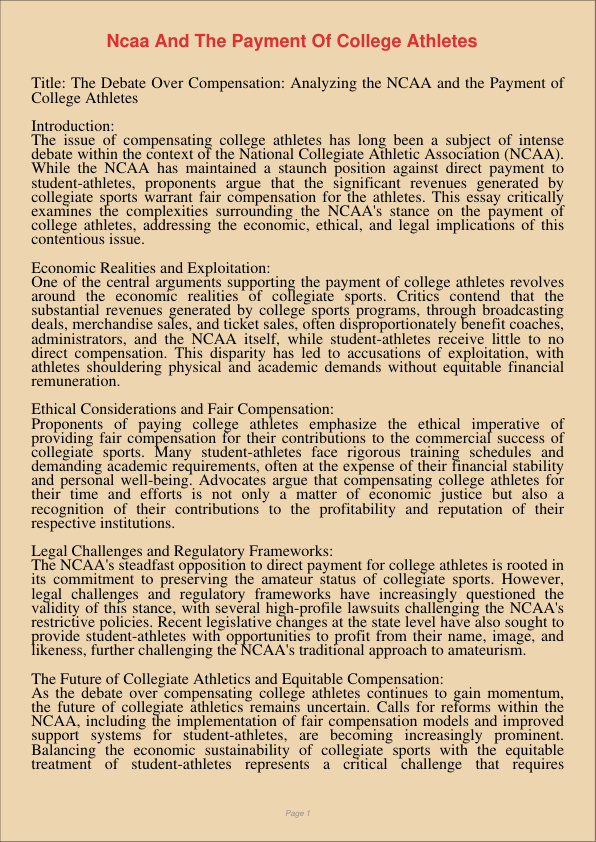Title: The Debate Over Compensation: Analyzing the NCAA and the Payment of College Athletes
Introduction: The issue of compensating college athletes has long been a subject of intense debate within the context of the National Collegiate Athletic Association (NCAA). While the NCAA has maintained a staunch position against direct payment to student-athletes, proponents argue that the significant revenues generated by collegiate sports warrant fair compensation for the athletes. This essay critically examines the complexities surrounding the NCAA’s stance on the payment of college athletes, addressing the economic, ethical, and legal implications of this contentious issue.
Economic Realities and Exploitation: One of the central arguments supporting the payment of college athletes revolves around the economic realities of collegiate sports. Critics contend that the substantial revenues generated by college sports programs, through broadcasting deals, merchandise sales, and ticket sales, often disproportionately benefit coaches, administrators, and the NCAA itself, while student-athletes receive little to no direct compensation. This disparity has led to accusations of exploitation, with athletes shouldering physical and academic demands without equitable financial remuneration.
Ethical Considerations and Fair Compensation: Proponents of paying college athletes emphasize the ethical imperative of providing fair compensation for their contributions to the commercial success of collegiate sports. Many student-athletes face rigorous training schedules and demanding academic requirements, often at the expense of their financial stability and personal well-being. Advocates argue that compensating college athletes for their time and efforts is not only a matter of economic justice but also a recognition of their contributions to the profitability and reputation of their respective institutions.
Legal Challenges and Regulatory Frameworks: The NCAA’s steadfast opposition to direct payment for college athletes is rooted in its commitment to preserving the amateur status of collegiate sports. However, legal challenges and regulatory frameworks have increasingly questioned the validity of this stance, with several high-profile lawsuits challenging the NCAA’s restrictive policies. Recent legislative changes at the state level have also sought to provide student-athletes with opportunities to profit from their name, image, and likeness, further challenging the NCAA’s traditional approach to amateurism.
The Future of Collegiate Athletics and Equitable Compensation: As the debate over compensating college athletes continues to gain momentum, the future of collegiate athletics remains uncertain. Calls for reforms within the NCAA, including the implementation of fair compensation models and improved support systems for student-athletes, are becoming increasingly prominent. Balancing the economic sustainability of collegiate sports with the equitable treatment of student-athletes represents a critical challenge that requires comprehensive reforms and a reevaluation of the NCAA’s existing policies and practices.
Conclusion:
The issue of compensating college athletes within the NCAA is a complex and multifaceted debate that encompasses economic, ethical, and legal considerations. While the NCAA has traditionally upheld the principle of amateurism, the changing landscape of collegiate sports and the evolving demands of student-athletes necessitate a reexamination of the existing framework. Achieving a balance between the economic viability of collegiate sports and the fair treatment of student-athletes requires comprehensive reforms that prioritize the well-being and equitable compensation of those whose contributions are central to the success and sustainability of collegiate athletics.

「真诚赞赏,手留余香」
真诚赞赏,手留余香
使用微信扫描二维码完成支付
